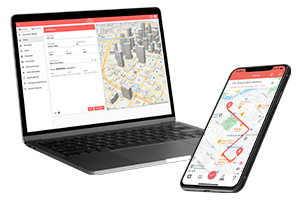Last updated on October 18, 2023
IRS’s Publication 463 describes what costs are deductible, how to include them on your tax return, what documents you need to show your expenses, and how to handle any refunds you could get for your expenses.
In this article, we’ve collected the most essential information you need to know as somebody who drives a car in order to create revenue.

Which part of Publication 463 is about car-related deductions?
Section 4 of Publication 463 provides guidance on tax deductions related to car expenses. The section outlines the rules and regulations surrounding these expenses, including what are deductible expenses, what documentation is required, and what limitations apply.
Types of Automobile Costs
Included among deductible auto-related costs on your tax return are:
- Depreciation: is the expense of buying and maintaining a vehicle over time
- Lease Payments: The expense of leasing an automobile
- Registration Fees: The cost of registering your automobile with the state
- The cost of your car insurance
- The expense of repairs and maintenance for your automobile.
- Cost of gasoline for trips related to business.
- Tolls and Parking: The expense of tolls and parking costs associated with business travel
- Necessary Documents for Automobile Costs
IMPORTANT: To claim car-related deductions, you must maintain accurate and well-organized documents that contain the date of the expense, the amount of the spending, the reason for the expense, and, if appropriate, the business relationship between the individuals involved.
Standard Mileage Rate vs. Actual Expenses Method
To maximize your car-related deductions, you must grasp the standard mileage rate vs. actual expenses method.
The standard mileage rate is a predetermined amount per mile driven for business purposes and is 65.5 cents/mile for 2023, but the actual expenses method considers the overall cost of operating your car for business purposes.
By understanding the distinctions between these two approaches, you will be able to evaluate which one is ideal for your particular case.
Why Maintaining Records Is Crucial
If you’re a small business owner or at least self-employed, you are aware of the importance of maintaining precise records to maximize your tax deductions. This is particularly true regarding costs associated with travel, entertainment, gifts, and auto expenses.
You must keep sufficient records and supporting paperwork, as required by the IRS, to prove any deductions you claim. We’ll delve deeper into the IRS Publication 463 recordkeeping requirements in this part of the article.
Generally, you must keep records that include the following information:
- The date of the expense
- The amount of the expense
- The location of the expense
- The business purpose of the expense
- The names and relationships of the individuals involved, if applicable
You can find more detailed instructions on the documentation requirements for travel, entertainment, gifts, and car expenses in IRS Publication 463.
How Long to Keep Records
You must maintain your records for at least three years from the date you file your tax return, according to IRS Publication 463. You might need to maintain your data for a longer period in some circumstances, though. For instance, you must preserve the documents for seven years if you want to claim a deduction for a bad debt or a loss from worthless assets.
What is a mileage log?
A mileage log serves as a record of the distance you travel for work. It contains the date of each trip, the beginning and finishing points, the intended use of the trip, and the distance traveled.
According to the IRS, “You should record the elements of an expense or of a business use at or near the time of the expense or use and support it with sufficient documentary evidence” to comply with the IRS’s recommendation that it be accurate and “should be” contemporaneous.
Some possibilities for keeping a mileage log are:
- a spreadsheet or paper mileage logbook
- a mileage-tracking app, such as MileageWise
- an accounting program with capabilities for tracking expenses
Whatever approach you go with, it’s crucial to maintain consistency and accuracy in your record-keeping. Make it a routine to enter your spending as soon as you can, and store all supporting documents in a secure location.
What does a “contemporaneous mileage log” mean?
A contemporaneous mileage log is a record of all the trips you make for business purposes, recorded at or near the time of the trip. To be considered contemporaneous, the log can be manually written, entered into Excel, or tracked in a mileage app like MileageWise, Google Maps, Waze, or a built-in GPS system.
Contemporaneous mileage logs should also be kept regularly and accurately, and be supported by evidence such as receipts, bills, and invoices.
If you’re tracking your business mileage using any of the methods mentioned above, even if you import your logs into MileageWise at a later date, it’s still considered contemporaneous because it was originally recorded at or near the time of your trip. It’s also crucial to know that you may edit your trips retrospectively.
Do I have to track my personal miles?
Although the IRS doesn’t require personal trips in your mileage log, it’s strongly recommended that you include them because it will provide clarity for both yourself and the IRS, since you need to separate your total business mileage, total personal mileage, and total commuting mileage for the year.
Also, logging your personal trips boosts the proficiency of MileageWise’s built-in IRS auditor function, which you need for an IRS-Proof result.
What is a tax home?
The publication defines a tax home as the location where you conduct business on a regular, continuous, and substantial basis, such as your main place of business or employment. If you have a tax home, expenses incurred for traveling between your tax home and other work locations are generally considered deductible.
However, if you do not have a tax home, expenses incurred for traveling between your residence and your work locations are generally not considered deductible. Understanding the concept of tax home is important for determining which travel expenses are deductible on your tax return and can help you maximize your tax deductions related to business expenses.

MileageWise, your designated mileage tracker app
MileageWise is a mileage tracking application that is designed to help users stay tax compliant with IRS Publication 463, which provides guidance on tax deductions related to business expenses, including car expenses.
Here are some ways in which MileageWise can help you stay tax-compliant with IRS Publication 463:
Retrospective Mileage Log Recovery
Are you trying to find a solution to add all the missing trips and miles to a mileage log for a previous year? The AI Wizard feature of MileageWise was created specifically for that purpose. It provides you with trip suggestions after learning and analyzing your driving patterns.
Moreover, the built-in IRS auditor checks and corrects 70 logical contradictions in your mileage log before allowing you to print it, making sure it is 100% IRS-Proof.
Google Timeline Trip Import
Don’t have a mileage log for a certain year in the past? Thankfully, Google Maps had already documented some of my journeys for you if you had Location History Turned on.
If you need a system that imports these trips and quickly and simply turns them into an IRS-Proof mileage record, MileageWise is here to the rescue!
Mileage Log Tax Preparation Service: What is it about?
Even though MileageWise’s program is quite simple, some would prefer to hire professionals to generate their ongoing or retrospective mileage records since they’re too busy to do it themselves.
MileageWise’s mileage log experts will quickly construct your mileage report using their Mileage Log Tax Preparation Service based on the information you provide them…you just need to print your IRS-Proof mileage log and sign it at the end of the day.
Conclusion
By using MileageWise, you can simplify the process of tracking your mileage and expenses, while also ensuring that you are tax compliant with IRS Publication 463. With accurate tracking, detailed reporting, automatic recording, IRS-compliant reporting, and cloud-based storage, MileageWise can help you maximize your tax deductions while minimizing your tax liability.



